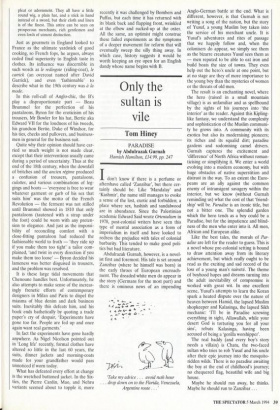Only the sultan is vile
Tom Hiney
PARADISE by Abdulrazak Gurnah Hamish Hamilton, £14.99, pp. 247 Idon't know if there is a perfume or aftershave called 'Zanzibar', but there cer- tainly should be. Like 'Mandalay' and `Kashmir', the name still manages to evoke a sense of the lost, exotic and forbidden; a place where sex, hashish and sandalwood are in abundance. Since the Palestinian academic Edward Said wrote Orientalism in 1978, post-colonial writers have seen this type of mental association as a form of imperialism in itself and have looked to redress the prejudice with tales of colonial barbarity. This tended to make good poli- tics but bad literature.
Abdulrazak Gurnah, however, is a novel- ist first and foremost. His tale is set around Zanzibar (where he himself was born) in the early throes of European encroach- ment. The dreaded white men do appear in the story (Germans for the most part) and there is ominous news of an impending `Take my advice . . . avoid rush hour . . . drop down on to the Florida, Venezuela, Argentine route . . Anglo-German battle at the end. What is different, however, is that Gurnah is not writing a song of the nation, but the story of Yusuf, a young Muslim boy taken into the service of his merchant uncle. It is Yusufs adventures and rites of passage that we happily follow and, when the colonisers do appear, we simply see them as the bizarre creatures Yusuf sees them as — men reputed to be able to eat iron and build boats the size of towns. They even help out the hero's uncle at one point, but at no stage are they of more importance to the young boy than the mysteries of women or the threats of old men.
The result is an enchanting novel, where the hero (raised in a small mountain village) is as unfamiliar and as spellbound by the sights of his journeys into 'the interior' as the reader. Against this Kipling- like fantasy, we understand the complexity and sophistication of the Muslim communi- ty he grows into. A community with its exotica but also its modernising pioneers; its riches and its squalid dirt; paradise gardens and sodomising camel drivers. Gurnah captures the excitement and `difference' of North Africa without roman- ticising or simplifying it. We enter a world evolving into a modern economy, but with huge obstacles of native superstition and distrust in the way. To an extent the Euro- peans are an ally against the common enemy of intransigent savagery within the interior, but we know (without Gurnah reminding us) what the cost of that 'friend- ship' will be. Paradise is an ironic title, but not a bitter one. The splendid garden which the hero tends as a boy could be a Paradise, but for the impatience and blind- ness of the men who enter into it. All men, African and European alike.
Like the best tales, the morals of Par- adise are left for the reader to guess. This is a novel whose pre-colonial setting is bound to draw attention away from its literary achievement, but which really ought to be read as the exciting and sad record of the loss of a young man's naiveté. The theme of boyhood hopes and dreams turning into the adult inevitability of compromise is worked with great wit. In one excellent scene, Yusuf s attempts to learn the Koran spark a heated dispute over the nature of heaven between Hamid, the lapsed Muslim shopkeeper and Kalasinga, the lapsed Sikh mechanic: 'I'll be in Paradise screwing everything in sight, Allawallah, while your desert God is torturing you for all your sins', rebuts Kalasinga, having been accused of being a 'gorilla worshipper'.
The real baddy (and every boy's story needs a villain) is Chatu, the two-faced sultan who tries to rob Yusuf and his uncle after their epic journey into the mosquito- ridden wilds. There is no paradise awaiting the boy at the end of childhood's journey; no chequered flag, beautiful wife and big house.
Maybe he should run away, he thinks. Maybe he should run to Zanzibar .


























































 Previous page
Previous page